These are the short stories that are either about to come out, are out now, or have come and gone—at least on paper. Some are available for purchase in electronic form, most are included in my short story collection Unpossible and Other Stories, and others are free for the reading on this site. Click the bookmark to see details below.
Just Another Future Song (in the anthology Glitter & Mayhem, 2013)
Begone (in the audio anthology Rip-Off!, 2012)
Message from the Bubblegum Factory (in the anthology With Great Power, 2010).
What We Take When We Take What We Need (Subterranean Magazine).
Glass (Technology Review Magazine, November/December 2008; Science Fiction: The Best of the Year, 2009 Edition, ed. by Rich Horton; Year’s Best SF 14, ed. by Hartwell & Cramer)
The Illustrated Biography of Lord Grimm (Eclipse 2, October 2008; Year’s Best Science Fiction, 26th Annual Collection, ed. by Gardner Dozois; Year’s Best Fantasy 9, ed. by Hartwell & Cramer)
Unpossible (F&SF, 10/07; Year’s Best Fantasy 8; Fantasy: Year’s Best, 2008 Edition)
Dead Horse Point (Asimov’s, 8/07; The Best Science Fiction and Fantasy of the Year, Vol. 2)
Damascus (F&SF, 12/06; Year’s Best SF 24th Annual Collection; Year’s Best SF 12)
Gardening at Night (F&SF, 4/06)
Second Person, Present Tense (Asimov’s, 9/05; Year’s Best SF 11; Year’s Best SF 23rd Annual Collection; and translations)—winner of the Asimov’s Readers’ Choice Award, and finalist for the Fountain Award and the Sturgeon Award.
The Continuing Adventures of Rocket Boy (F&SF, 7/04)
Free, and Clear (F&SF, 2/04)
An Equitable Distribution (Hitchcock’s, 10/97)
The Sound of Glass Breaking (Antietam Review, Spring ’92)
Taking the High Road (Amazing, 9/91)
_____________________________________________________________
“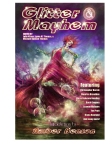 Just Another Future Song”
Just Another Future Song”
_____________________________________________________________
“Begone”
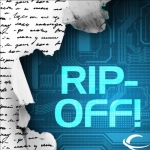 This was written for the audio-only anthology Rip-Off! edited by Gardner Dozois. All stories begin with the first line of a famous work and spin off into SF and fantasy stories. I took the first line from Dickens’ David Copperfield: “Whether I shall turn out to be the hero of my own life, or whether that station will be held by anybody else, these pages must show.” The story goes on to consider the plight of a man who’s been replaced in his own life by someone taller and more handsome. Anyone who grew up on 60′s sitcoms will recognize the poor bastard. Available on Audible.com and Amazon.
This was written for the audio-only anthology Rip-Off! edited by Gardner Dozois. All stories begin with the first line of a famous work and spin off into SF and fantasy stories. I took the first line from Dickens’ David Copperfield: “Whether I shall turn out to be the hero of my own life, or whether that station will be held by anybody else, these pages must show.” The story goes on to consider the plight of a man who’s been replaced in his own life by someone taller and more handsome. Anyone who grew up on 60′s sitcoms will recognize the poor bastard. Available on Audible.com and Amazon.
_____________________________________________________________
“Message from the Bubblegum Factory”
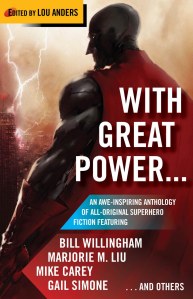 An ordinary man in a superpowered world, and he isn’t going to take it anymore. This is for the original anthology “With Great Power,” edited by Lou Anders, featuring stories by comics writers, fiction writers, and those multi-talented jerks who do both so well. Chris Roberson and Bill Willingham, are you listening to me? Anyway, I’ve never had so much fun writing a story.
An ordinary man in a superpowered world, and he isn’t going to take it anymore. This is for the original anthology “With Great Power,” edited by Lou Anders, featuring stories by comics writers, fiction writers, and those multi-talented jerks who do both so well. Chris Roberson and Bill Willingham, are you listening to me? Anyway, I’ve never had so much fun writing a story.
_____________________________________________________________
“What We Take When We Take What We Need”

An alternate take on some of the themes and characters from my novel The Devil’s Alphabet, and my longest title ever. This appeared in Subterranean Magazine.
_____________________________________________________________
“Glass”
 Technology Review Magazine
Technology Review Magazine
(November/December issue, 2008). Also appeared in Science Fiction: The Best of the Year, 2009 Edition, ed. by Rich Horton, and Year’s Best SF 14, edited by David Hartwell and Kathryn Cramer.
A brief tale of psychopaths, experimental drugs, and mirror neurons, set in a prison medical wing.
Technology Review Magazine, available in print and on the web, doesn’t usually publish fiction, but every so often they run a science fiction story.
Read for free on the Technology Review site.
_____________________________________________________________
“The Illustrated Biography of Lord Grimm”
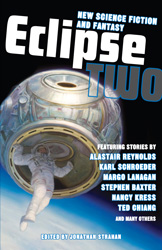
Eclipse 2 (October, 2008). Also appeared in The Year’s Best Science Fiction, 26th Annual Collection, ed. by Gardner Dozois, and Year’s Best Fantasy 9, ed. by Hartwell & Cramer.
When superheroes invade a supervillain’s island nation, what happens to the minions? Any similarities to the current debacle in Iraq are entirely intentional.
Eclipse is an annual anthology of new, original science fiction and fantasy edited by Jonathan Strahan. There’s no theme—only Mr. Strahan’s excellent taste. (I’d say that even if I wasn’t in the book.) (No, really.)
Reviews
Rich Horton of Locus Magazine selected it as one of the Recommended Stories for the month. After discusssion first the science fiction stories, then the fantasy stories, he says this: “Finally a borderline case is also among the best stories here… the political overtones are obvious here, and well expressed.” (Full excerpt)
Buy It
Nightshade Books Online Store ($14.95)
_____________________________________________________________
“Unpossible”

The Magazine of Fantasy and Science Fiction, (10/07). The story also appeared in Year’s Best Fantasy #8, edited by David Hartwell and Kathryn Cramer, and Fantasy: The Best of the Year, 2008 Edition, edited by Rich Horton.
This is a story about all those children who had fantastic adventures in the “lands beyond”—and what happens when they hit 50, realize that life hasn’t lived up to the storybook ending, and try to go back.
Reviews
The story made Locus Magazine’s Recommended Reading List for 2007.
Rich Horton of Locus Magazine selected it as one of the Recommended Stories for the month. (Full Review)

Tangent Online called it “A bittersweet tale that evokes the nostalgia of middle age and the endless promise of childhood at the same time.” (Full Review)
Nick Gevers of Locus Magazine also used the “bittersweet” word. In reviewing the trio of “solid, worthwhile” short stories in the issue, he said of “Unpossible”: “Nothing exceptionally original here, but a bittersweet mood is skillfully evoked.” (Full Review)
Buy it
An electronic version of the (double-size!) issue of F&SF is on Fictionwise.com ($5.99).

_____________________________________________________________
“Dead Horse Point”

Asimov’s Science Fiction Magazine. (8/07),
The Best Science Fiction and Fantasy of the Year, Vol.2 (Jonathan Strahan, ed.)
A story about quantum mechanics, the demands of friendship and kinship, and whether the universe permits any such thing as free will—set in my favorite state park.
Reviews
The story made the Locus Magazine Recommended Reading List for 2007.
Niall Harrison, editor of Vector, called it “marvelous and economical” and puts it in context with other stories in Strahan’s Year’s Best collection. Full Review.

SF Signal gave it 5 out of 5 stars and called it “emotional stuff”. Full Review.
Locus Magazine’s two short-fiction reviewers weighed in. Nick Gevers thought the Rucker/Sterling story made the other fiction in the issue feel tired, except for “Dead Horse” and Jack Skillingstead’s “Thank You, Mr. Whiskers.” Gevers on DHP: “Fortunately, ‘Dead Horse Point’ by Daryl Gregory has a shocking surprise at its close, suggesting both the emptiness of notions of free will and the merciless logic that must follow.”
Gevers’ colleague at Locus, Rich Horton, called DHP the most interesting story in the issue (really? more interesting than Rucker and Sterling’s transdimensional ants?) but said that it doesn’t quite work. Full review from both Gevers and Horton.
Kimberly Lundstrom of Tangent Online said, “Gregory draws affecting characters and employs an apt metaphor of trapped animals in this poignant tale of love and desperation.” Full review.
BestSF.net called it “Top Quality.” Full review.
And Sam Tomaino of SFRevu was pleased with the issue, rating all of the stories as “very good.” So, that’s kind of a review.
Full review of the issue on SFRevu.
Buy it
An electronic version of the issue of Asimov’s is on Fictionwise.com ($3.99).
Side Notes
Gabriel McKee has an interesting discussion of the story in SF Gospel, his blog focused on “explorations of religion in science ficiton and popular culture.” He raises the point that concept of space-time in the story is similar to Augustinian eternalism. I would have mentioned eternalism in the story, except I didn’t know about it until I read McKee’s blog. I should really read the reviews before I write—that would save time and make me look smarter.
_____________________________________________________________
“Damascus”

The Magazine of Fantasy and Science Fiction, (12/06). The story will also appear in Gardner Dozois’ The Year’s Best Science Fiction, 24th Annual Collection (2007) and Hartwell and Cramer’s Year’s Best SF 12 (2007).
A woman on the edge is saved by the intervention of her own personal Jesus. It’s a story about religious conversion, the neuroscience of spiritual belief, and biochemical evangelism.
Reviews

Locus Magazine’s Gary Wolfe called it “Terrific”, and his colleague Nick Gevers
picked it as a recommended story for the month and said, “‘Damascus’ is a potent addition to SF’s literature about matters spiritual, and surely, for its courage and sympathy, deserves an award or two.” Full review.
The story also made the Locus Magazine Recommended Reading List for 2006.
Janice Clark of Tangent Online said of the story, “Chillingly realistic, it presents a glimpse of what could happen if even one ambitious, efficient medical professional were convinced that bio-terrorism was the road to salvation… You may find parts of this story offensive or shocking, but you definitely won’t find it dull.” Full review.
Mark Watson of BestSF.net had this to say: “Gregory’s stories have pretty much fallen into two
categories for me – those which impressed, and those which did little if anything for me. This story joings [sic] ‘Second Person, First Tense’ [well, close] and ‘The Continuing Adventures of Rocket Boy’ in the former of these categories.” Here’s to one in the former and not the latter! Full review.
The story was also an Honorable Mention in The Year’s Best Fantasy and Horror (2007, 20th annual, ed. by Datlow, Link, and Grant).
Buy it
An electronic version of the F&SF issue is at fictionwise.com (~$4)
Purchase Best SF 12 on Amazon ($7.99)
Purchase Year’s Best 24th on Amazon ($14.93)
_____________________________________________________________
“Gardening at Night”
The Magazine of Fantasy and
Science Fiction, (4/06).
This is a near-future hard-ish SF story about complex systems: artificial
life, rapidly mutating diseases, and ordinary human families. All this and the
secret meaning of the Garden of Eden story.
Reviews
Tangent Online’s Elizabeth Allen said that the story “sneaks up on you in the best of all possible ways.” Full review.
Epinions.com called it “an interesting story with intriguing allusions to the meaning of our existence… All in all, this is a great story.”
SFRevu also had a brief review of the issue.
Last but not least, Rich Horton of Locus called it the best story in an issue that was “a bit lackluster”: “…a thoughtful, interesting, well-done story—but it isn’t a ‘wow’ story.” Run out and get your copy today!
Buy it
FictionWise has an electronic version for $2.99.
_____________________________________________________________
“Second Person, Present Tense”
Asimov’s Science Fiction Magazine.
September 2005. It also appeared in Gardner Dozois’ The Year’s Best Science Fiction, 23rd Annual Collection (2006), Year’s Best SF 11 (2006), edited by David Hartwell and Kathryn Cramer, and in a few translations (below).
For a limited time, you can read the story (for free, natch) on The Asimov’s website.
It’s a story about a new person in an inherited body, plus Buddhism vs Christianity, strange but true neurological oddities, and the lessons of Margaret Wise Brown’s “The Runaway Bunny.”
Translations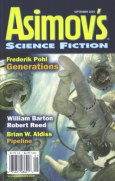
Bli-Panika, the Israeli SF web magazine (whose title translates as “Don’t Panic”), in Hebrew. Read it here.
Pandora #1. German print magazine, in German, natch.
Aqua-Cerro. Columbian SF anthology, in Spanish.
Kroki w Nieznane 2007. Polish anthology of fantastic fiction (possibly translates as “Voyages
to the Unknown”).
Sci-Fi magazin #9 (June 2008). Romanian science fiction magazine.
Award (singular) and some near misses
Asimov’s Reader’s Award for Best Novelette of 2005 (click to see horrible picture). Thanks, Asimovians. You know who you are.
Theodore Sturgeon Memorial Award Finalist. The Sturgeon is the award for the best short SF.
Fountain Award Honorable Mention. The Fountain Award is sponsored by the Speculative Literature Foundation (SLF) and is given to “a speculative short story of exceptional literary quality, chosen from work nominated by magazine and anthology editors.” My thanks to
Sheila Williams for nominating my story, and to the jurors for putting it on their short list.
Nebula Preliminary Ballot. The Nebulas are the awards given by SFWA, the Science Fiction Writers of America. Alas, I was voted off Nebula Island before the final ballot.
Reviews
Locus put the story on their 2005 Recommended List. In his review of the year’s best-of annuals, Gary K. Wolfe called it “a powerful and masterfully controlled tale… not only one of the best drug stories of the year (without being too didactic about it) but also one of the most acute portrayals of adolescent alienation.”
And when the story came out, both short fiction reviewers listed this as a recommended story for the month. Rich Horton said the story “offers a fascinating look at the nature of our identity and consciousness.” Nick Gevers added, “Gregory ends the story surprisingly but with eminent good sense, shrewdly underlining the broader human equation involved.”
Internet Review of Science Fiction Their short-fiction reviewer BlueJack said, “Reviewers all have favorite kinds of fiction, I am sure, and Gregory delivers a story that hits all my buttons:
the science is good, up-to-date, intriguing, and central to the story. The story, however, is about real, believable people. It has a very powerful emotional arc that is moving without being manipulative.”
Tangent Online called it “the real star in this issue, succeeding both as mind-popping SF and as a moving look at a teenager’s troubled relationship with her parents… [the story] also works as a reminder of one of science fiction’s greatest aspects: the ability to highlight classic themes with magnesium-flare intensity, thanks to the author’s innovation.”
Strange Horizons’ Dan Hartland, in a review of the Hartwell/Cramer collection, that the story “lights up this collection with wit and intelligence…. Smoothly but discomfortingly written, the story’s concept—that consciousness isn’t the controller but the controlled—is intelligently explored and then, crucially, spun out in thoroughly human directions.
Buy it
An electronic version of the Asimov’s issue is at
fictionwise.com ($4)
Or you can order
Year’s Best SF #11 or Year’s
Best SF 23.
_____________________________________________________________
“The Continuing Adventures of Rocket Boy”
Novelette in The Magazine of Fantasy and
Science Fiction, July 2004.
This is not so much a science fiction story as a story about
science fiction, and the magical thinking that is so attractive when you’re a bored kid in Bumblefuck, Iowa. I’ll be forever grateful to Gordon van Gelder for buying a story on the crumbling edge of his target demographic.
Reviews
Honorable Mention in Year’s Best Science Fiction #21 (Dozois, ed.)
and Year’s Best Fantasy & Horror #17 (Datlow, Link, and Grant, eds.).
Locus:
Nick Gevers called it “a
masterful study of SF’s original escapist roots.”
The Internet Review of Science Fiction
said, “Daryl Gregory offers a challenging and haunting story of adolescence, imagination, and abuse.”
mumpsimus: On the 2004 list for “Some Good Stories.” (Matthew
Cheney
refuses to call them “the best of the year” because “I haven’t read all the
stories of the year, and haven’t even read all the major publications, never
mind the minor ones.” You gotta admire honesty.)
www.bestsf.net:
“A very human, very powerful story…”
Read it
Buy it
Pick up an e-book copy of the entire issue for about $4 at FictionWise
and PalmOne.
_____________________________________________________________
“Free, and Clear”
Short story in The Magazine of
Fantasy and Science Fiction, February 2004.
A desperate man with Olympic-level allergies, and a new-age masseuse
who’ll go to extremes to clear the blockage. It was my goal to write the
first graphic sinus story, and by God, I still have the genre to myself. Not
for the squeamish.
Read it
On this site for free (and clear)
Reviews
The Commonplace
Review said, “Daryl Gregory elegantly spins a surreal and metaphorical
tale of Edward’s quest to be free from his allergies.”
The Internet Review of Science Fiction
called it a story about “an allergy treatment that’s out of this world” in
“a standout issue of F&SF.”
_____________________________________________________________
“An Equitable Distribution”
Short-short in
Alfred Hitchcock Mystery
Magazine,October 1997.
My friend, lawyer, and fellow writer Gary Delafield handed me a great—and
true—premise for a short-short about an old woman and the unusual advice she
gets from her lawyer. Hijinks ensue.
Never reviewed, so you’ll have to make up your own mind.
Read it
On this site for free (how equitable is
that?)
_____________________________________________________________
“The Sound of Glass Breaking”
Short story in Antietam Review, Spring 1992.
A mainstream story about that moment when you realize the walls are thin,
the streets are dark, and there’s no way you can protect what you love.
Never reviewed. (Not surprising, considering this was an issue of a literary
magazine read by perhaps 50 people, 10 of whom were on-staff. )
Read it
_____________________________________________________________
“Taking the High Road”
Short story in Amazing
Stories. September 1991.
A story about two childhood friends, a war, and the time-dilation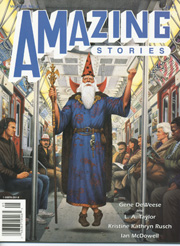
effects that send them on different roads—but it’s really about coming home
from college and finding all your friends gone.
Never reviewed by anyone I could find, but my mother liked it. (Not
actually true.)
Buy it
Get a paper copy of the issue
_____________________________________________________________
“In the Wheels”
Novelette in The Magazine of
Fantasy and Science Fiction. August 1990.
My first sale, a rollicking post-apocalyptic tale of drag racing and
demons. You heard me.
Reviews
A Locus recommended novelette for the year.